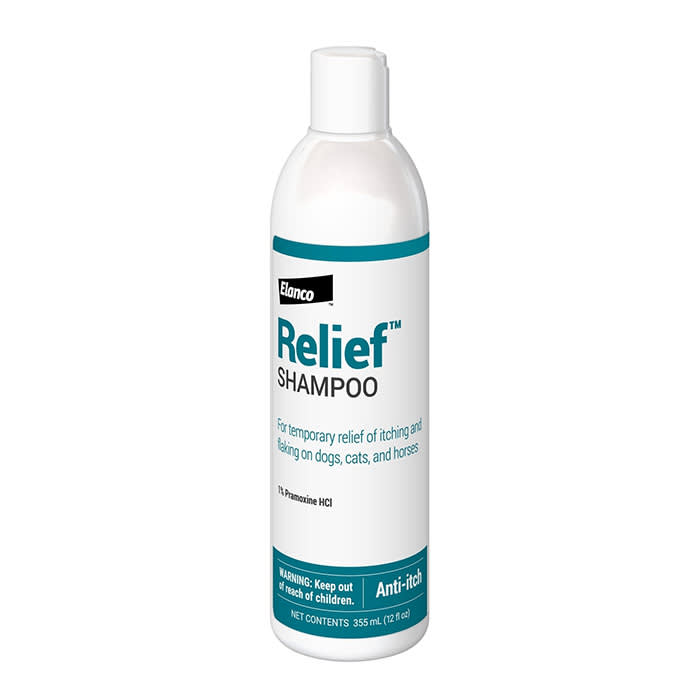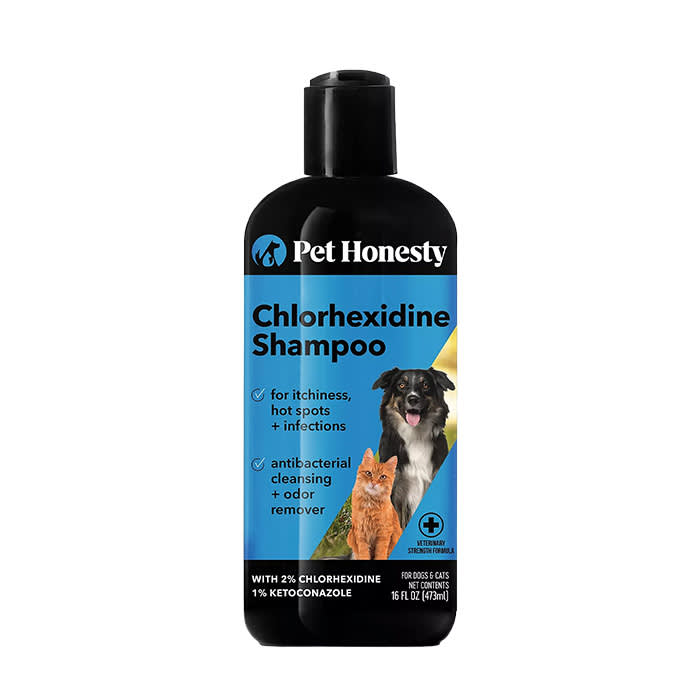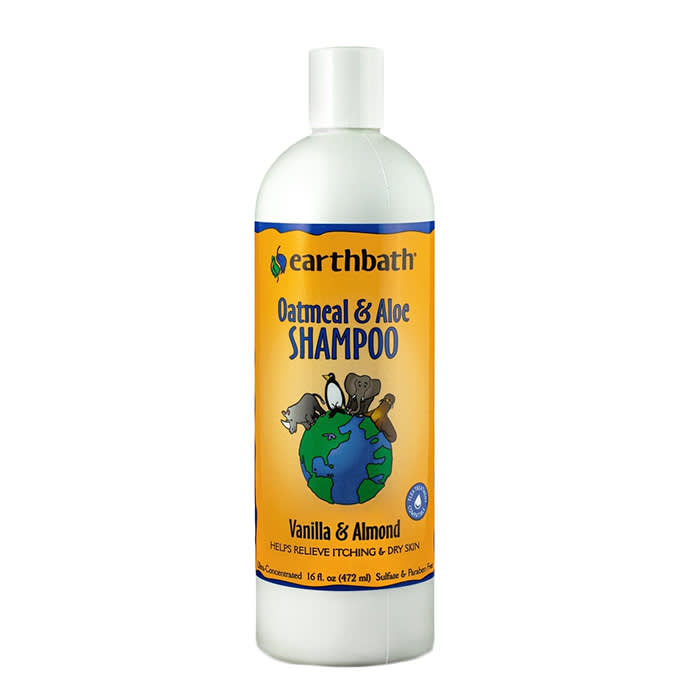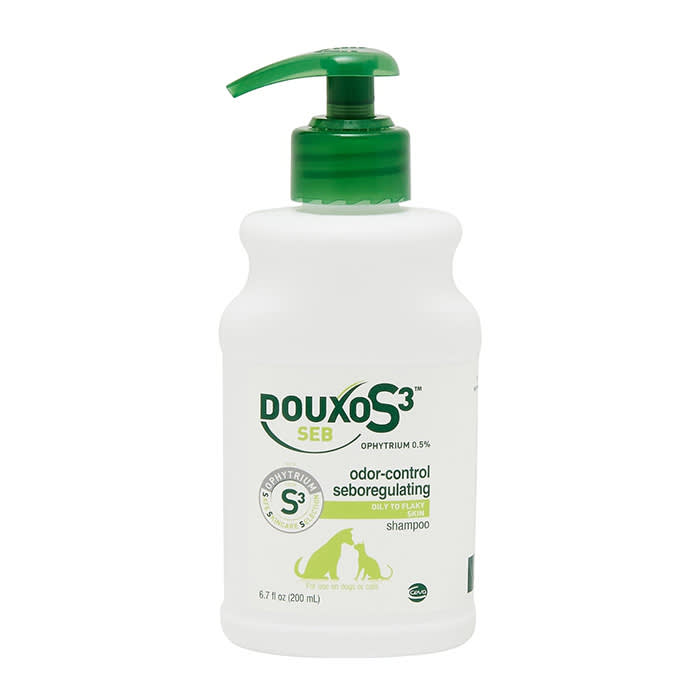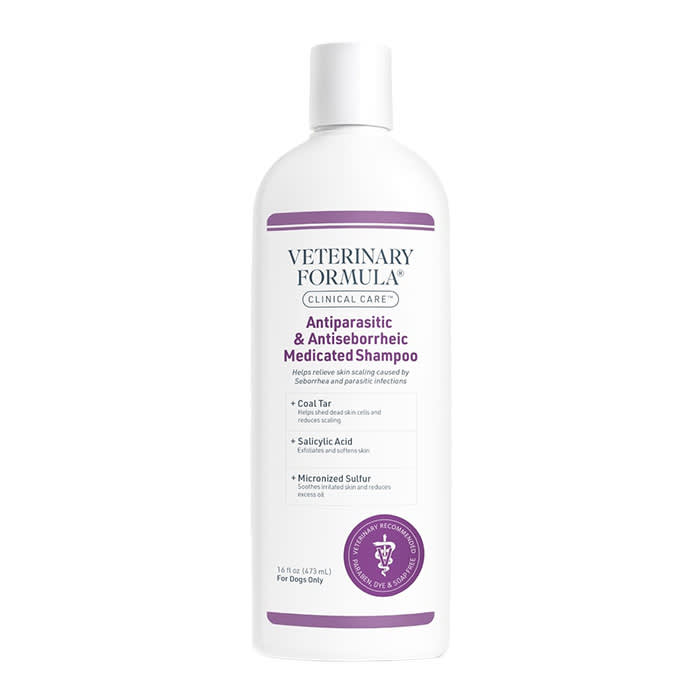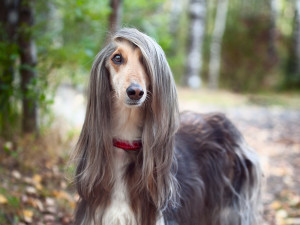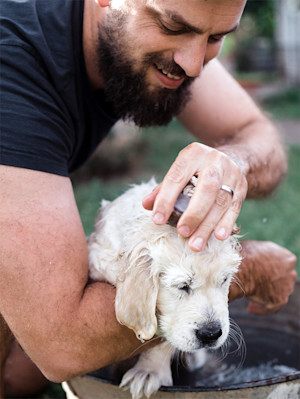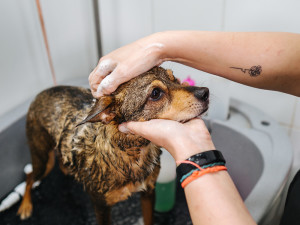The Best Shampoos for Itchy Skin—Reviewed
No one likes to be scratching 24/7. These products should help.

Share Article
In This Article:
The Top Five Shampoos for Itchy Skin Frequently Asked Questions
Just like an itchy scalp can ruin a human’s day, itchy skin under a pup’s coat is a big problem for your pup. The good news is that there’s a wide range of anti-itch shampoos available to help. The bad news is that the world of anti-itch shampoos can be a minefield of tricky ingredients that might make matters worse if you’re not careful. The shampoos listed below contain soothing ingredients and healthy compounds designed to minimize scratching and keep the coat healthy, shiny, and irritation-free.
Many of these shampoos contain antipruritic ingredients, such as pramoxine, oatmeal, and aloe. Some also include antiseptic compounds, particularly chlorhexidine, which has a strong track record in veterinary dermatology for treating or preventing secondary bacterial infections (like superficial pyoderma) when used correctly. Just make sure you follow the recommended contact time and technique. Whether your dog is prone to seasonal allergies, lives in a hot and humid climate that triggers irritation, or has a pre-existing skin condition, one of these shampoos is likely to provide relief.
Btw, our editors (and their pets) picked out these products. They’re always in stock at the time we publish, but there’s a chance they’ll sell out. If you do buy through our links, we may earn a commission. (We’ve got a lot of toys to buy over here, you know?)
The top five shampoos for itchy skin
Elanco Relief Shampoo with Pramoxine & Colloidal Oatmeal opens in new tab
Pet Honesty Chlorhexidine Cat & Dog Seasonal Itch Relief Shampooopens in new tab
Douxo S3 SEB Odor-Control Seboregulating Shampooopens in new tab
Veterinary Formula Clinical Care Antiparasitic & Antiseborrheic Medicated Shampooopens in new tab
How to choose the shampoo that’s best for your dog
Look for these ingredients on the label:
Colloidal oatmeal, aloe vera, tea tree oil, hydrocortisone
Avoid these ingredients:
Parabens, dyes, artificial fragrances
Are there any safety or health issues to consider with anti-itch shampoos?
There are several potential issues with shampoos sold as “anti-itch,” most of which are caused by ingredients presented as “all-natural” but that actually contain chemicals such as formaldehyde preservatives (which can release known carcinogens) sulfatesopens in new tab (which can strip natural oils from a dog's coat) and even petroleum byproducts (which can cause central nervous system issues). There is also a significant ingestion risk for ingredients that are otherwise helpful, such as tea tree oilopens in new tab.
How much does a good anti-itch shampoo cost?
The good news is that a quality anti-itch shampoo from a trusted brand won’t break the bank. You can find effective products ranging between $6 and $20 per bottle, depending on the formulation and size. However, if you end up having to go to the vet for a prescription shampoo, the price (as well as the size of the bottles) might change dramatically, with the former getting smaller and smaller and the latter getting larger and larger.
The five best anti-itch shampoos
Pros
Combines pramoxine (a mild topical anesthetic) with colloidal oatmeal to soothe itching, inflammation, and dryness
Soap-free formulation, gentle on the skin barrier
Contains omega-6 fatty acids and humectants to moisturize and support the skin barrier
Marketed for temporary relief of symptoms like flaking, redness, and irritation
Often highly rated among pet parents and reviewers for itchy-skin relief
Cons
Temporary relief, not a cure for underlying causes like allergies, parasites, or infections
Some dogs who are sensitive may still experience irritation or redness
Requires proper contact time (usually five to 10 minutes) for effectiveness
Overuse could potentially disrupt skin balance
Does not have strong antibacterial or antifungal properties
Pros
Chlorhexidine reduces bacterial load, helpful when secondary infections accompany itch
Aloe adds soothing support for irritated skin
Especially useful during seasonal allergy flare-ups
Cons
Chlorhexidine can be drying or irritating if overused or left on too long
Improper rinsing may leave residue that irritates the skin
Does not address fungal overgrowth, parasites, or other underlying causes
Limited independent data on optimal usage and safety
Pros
Contains colloidal oatmeal and organic aloe, both recommended by veterinarians for soothing dry or irritated skin
Free from harsh chemicals like sulfates, parabens, gluten, and synthetic dyes
Gentle enough for sensitive skin
Biodegradable and environmentally friendly
Widely available and economical for routine use
Cons
Mild formulation may not be sufficient for bacterial or fungal infections
Some dogs who are highly reactive may find relief inadequate
For dogs with oily or seborrheic skin, may not control excess sebum, odor, or flaking
Pros
Targets seborrheic skin conditions (oily, flaky, and odorous)
Contains Ophytrium, a dermatological ingredient that supports the skin barrier and healthy microflora
Reduces dandruff and malodor
Soap-free and suitable for sensitive skin
Often recommended by veterinarians for non-prescription skin care
Cons
Limited antimicrobial power if bacterial or fungal infections are the primary cause
May require multiple sequential applications to see significant improvement
Higher cost per use due to concentrated active ingredients
Overuse can dry skin
Pros
Treats seborrhea, parasitic issues (like mites), and antifungal/antiseptic concerns
pH-balanced for canine skin, free from harsh soaps, parabens, and dyes
Pet parents report marked improvements in itching and flaking within days
Affordable compared to some prescription options
Cons
Stronger formulation carries a higher risk of irritation if misused
Some pet parents report a strong medicinal smell
Not formulated for cats
Overuse can dry the skin or strip lipids
Provides temporary symptom relief if underlying allergies or systemic issues remain
FAQs
How do anti-itch shampoos work?
Anti-itch shampoos generally soothe inflammation, redness, and itchiness while removing allergens from the skin and coat. Ingredients like colloidal oatmeal are particularly effective at calming irritated skin.
How often should you use anti-itch shampoos on your dog?
Frequency depends on the product and the condition of your dog’s skin. Over-the-counter shampoos may need more frequent application due to shorter residual effects. Prescription shampoos should follow your veterinarian’s guidance.
What if your dog’s itchiness is severe?
Persistent or severe itch warrants a veterinarian visit. Often, a prescription shampoo, oral medications, immune-supporting therapies, or omega-3 fatty acids may be recommended.

Timothy Baker
Timothy Baker’s work has appeared in Thrillist, Chowhound, CNBC, Newsweek, CBS Sports, The Game Master’s Guides, SyFy, and NBCUniversal. He is lucky enough to have two dogs in his life: Snoop, a nine-year-old Rhodesian Ridgeback / Dachshund mix (and complete diva) and Summer, a three-year-old Bernedoodle with a heart of gold.
Related articles
![A afghan hound standing in the woods with long silky hair.]()
The Best Dog Shampoos of 2025
It’s time for a self-care day.
Can You Use Human Shampoo on Dogs?
Dog baths should include dog bath products only. Here’s why.
What Can I Wash My Dog With?
They would prefer no bath at all, but we’re not asking them.
![A person giving a dog a bath in a bathtub.]()
Tips on How to Brush and Bathe Your Dog from a Pro
Groomer extraordinaire Robyn Michaels explains best brushes and how to keep your pup well-groomed.
![bearded man gives his puppy a bath]()
What Is the Best Shampoo for Puppies?
Because nothing is cuter than a puppy bath.
![Person with rose tattoo on their arm washing a brown mixed breed medium-sized dog in a self-service dog washing station]()
Skipping the Groomers? Try These DIY Dog Wash Tips
Save money and groom your pup yourself with these tips from a pro.
